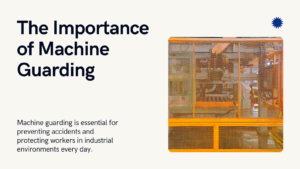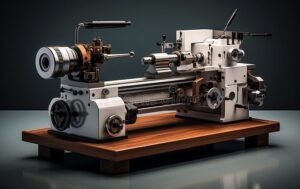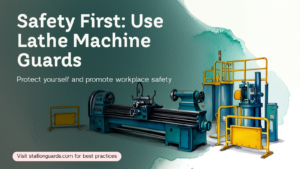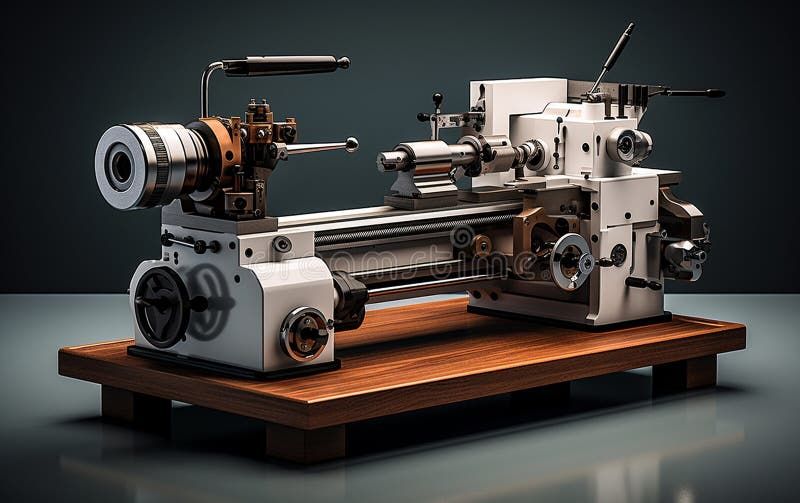The Essential Role of Machine Guarding in Industrial Safety
In the industrial world, machines are the heartbeat of productivity. They shape, cut, weld, assemble, and transport—driving efficiency across factories and workshops. But with such power also comes risk. Moving gears, sharp blades, rotating shafts, and high-speed conveyors can pose serious hazards if not properly managed. That is why machine guarding has become one of the most vital components of workplace safety.
Machine guarding is the practice of installing protective devices—such as barriers, enclosures, or interlocks—around machinery to keep workers safe from moving parts and other dangers. Beyond simply following regulations, investing in effective guarding ensures that employees feel secure, operations remain uninterrupted, and businesses uphold their duty of care.
Why Machine Guarding Is Essential
 Industrial history has shown that unguarded machinery is one of the leading causes of workplace injuries. Common accidents include amputations, crushing injuries, and severe lacerations. Each of these incidents not only affects workers but also disrupts business operations through downtime, investigations, and potential legal consequences.
Industrial history has shown that unguarded machinery is one of the leading causes of workplace injuries. Common accidents include amputations, crushing injuries, and severe lacerations. Each of these incidents not only affects workers but also disrupts business operations through downtime, investigations, and potential legal consequences.
Machine guarding serves three key purposes:
-
Protecting Workers – The most obvious benefit is reducing the risk of contact with dangerous parts. Guards act as a physical barrier between people and hazards.
-
Regulatory Compliance – Occupational Safety and Health Administration (OSHA) standards in the U.S. and PUWER regulations in the U.K. require machines to be safeguarded. Failure to comply can result in fines, lawsuits, and reputational damage.
-
Boosting Confidence & Productivity – When employees feel safe, they are more focused and efficient, leading to improved overall productivity.
In essence, machine guarding is not just a technical necessity; it is also a strategic investment in the workforce and the business itself.
Stallion Guards: A Reliable Safety Partner
For organizations looking for robust safety solutions, Stallion Guards has positioned itself as a trusted name. Their products focus on delivering a balance between safety, durability, and usability, making them a preferred choice across multiple industries.
Features That Stand Out
-
360° Zero-Contact Design – Ensures no accidental access to moving parts.
-
Ergonomic and User-Friendly – Guards are lightweight, easy to install, and allow visual inspection through perforated panels.
-
Durability – Built from heavy-duty, powder-coated steel, ensuring long service life even in challenging environments.
-
Unique Identifier (UIN) – Every unit is traceable, simplifying audits, maintenance, and compliance checks.
The Advantages
-
Improves workplace safety with comprehensive coverage
-
Saves time through fast installation and simple removal
-
Supports compliance with global safety standards
-
Reduces maintenance delays with inspection-friendly designs
Considerations
-
Customization Needs – Unique machines may require specialized designs.
-
Initial Investment – Premium quality may cost more upfront compared to generic alternatives, but long-term benefits outweigh the cost.
With Stallion Guards, safety doesn’t come at the cost of efficiency. Instead, their design philosophy ensures that protection enhances workflow rather than hindering it.
Types of Machine Guarding
Machine guarding is not a one-size-fits-all solution. Different industrial settings require different guarding techniques:
-
Fixed Guards – Permanent enclosures that prevent access to hazardous parts.
-
Interlocked Guards – Automatically stop the machine when the guard is opened.
-
Adjustable Guards – Can be repositioned to suit various processes.
-
Perimeter Guards – Fencing systems that enclose larger equipment, robots, or automated cells.
Best Practices in Guarding:
-
Guards must not create new hazards (e.g., sharp edges or pinch points).
-
They should be securely attached to withstand vibration and pressure.
-
Machines with movable guards should not restart automatically when reopened; a manual reset is recommended.
-
Regular inspections should be conducted to ensure guards remain effective.
Machine Guarding in the Age of Automation
The modern workplace is evolving. Robotics, AI, and smart monitoring systems are now integral to manufacturing. With greater automation, safety measures must adapt too.
This is where machine guarding integrates with technology. Physical guards protect against immediate contact risks, while digital tools enhance predictive safety. For example, AI-driven workplace monitoring can identify unsafe behaviors or machine malfunctions before they cause accidents. The combination of traditional safety hardware with modern AI insights ensures industries stay productive and compliant in the face of rapid change (CoreGuideAI).
This blending of physical and digital safety represents the future—guarding workers not just against physical harm, but also ensuring a proactive approach to risk management.
Frequently Asked Questions
Q1. What is machine guarding?
Machine guarding is the installation of protective barriers around machines to prevent accidents caused by direct contact with dangerous parts.
Q2. What makes Stallion Guards unique?
They combine ergonomic design, durable build, and traceability features (UIN) that simplify compliance and maintenance.
Q3. Do machine guards slow down production?
No. In fact, they streamline workflow by reducing accidents, downtime, and lengthy maintenance interruptions.
Q4. How often should guards be inspected?
Monthly inspections are recommended, but facilities with high machine usage may require more frequent checks.
Q5. Are Stallion Guards compliant with international standards?
Yes. They are designed in line with OSHA, PUWER, and ISI safety requirements, making them reliable across global operations.
Final Thoughts
Machine guarding is not just a compliance requirement—it is a fundamental commitment to worker safety and organizational efficiency. By preventing accidents, ensuring legal compliance, and creating a culture of trust, it forms the backbone of industrial safety programs.
Stallion Guards has taken this responsibility further by creating products that are not only strong and reliable but also user-friendly and technologically smart. Their guards protect without slowing down operations, ensuring businesses can achieve safety and productivity together.
In a world where industrial growth is tied to both efficiency and responsibility, machine guarding stands as a clear reminder: protecting people is the first step in protecting progress.
Belt Conveyor Guarding: Why It Matters for Workplace Safety
Introduction
Workplace safety isn’t just a regulation—it’s a responsibility. One of the most overlooked areas in industrial environments is belt conveyor guarding. Every year, accidents occur because workers underestimate how quickly a conveyor system can become dangerous. A conveyor belt moves at an average speed of 600 feet per minute—that’s 10 feet per second. In just one second, loose clothing, a hand, or even an entire arm could be drawn into a pinch point. This is why proper conveyor guarding isn’t optional; it’s essential.
Why Do We Need Belt Conveyor Guarding?
Many workers believe guarding is only about compliance—“because the government says so.” But the real reasons are much deeper:
-
Protecting Workers – The primary goal is to keep employees safe from rotating shafts, pulleys, and rollers.
-
Reducing Liability – Accidents result in downtime, lawsuits, and fines. Guarding minimizes risks.
-
Doing the Right Thing – Safety standards exist because someone, at some point, was injured.
-
Beyond the Workplace – The most important reason to stay safe is for life outside of work—family, health, and future.
The Dangers of Conveyor Belts
-
Speed Factor: At 10 feet per second, a worker cannot react fast enough to avoid a hazard.
-
Motor Power: Even small motors can grab clothing or fingers. Larger motors (8 hp and above) can pull a person entirely into machinery.
-
Emergency Pull Cords: While useful, they are not guards. A conveyor may take 25–90 feet to stop even after pulling the cord.
Setting a Guarding Policy
A strong belt conveyor guarding policy should be built on safety laws, standards, and worker participation:
-
Use CSA-Z432 Safeguarding of Machinery guidelines for guard placement.
-
Involve owners, managers, and safety committees.
-
Ensure workers understand why guarding matters.
-
Standardize best practices across all equipment.
Building Effective Conveyor Guards
When designing or installing guards, consider the following:
-
Maintenance-Friendly: Guards should be easy to remove, lightweight (under 50 lbs), and manageable by one person.
-
Durability: They must withstand normal operational forces.
-
Recognition: Guards should be painted safety yellow or another standard “danger” color.
-
Simplicity: Easy to install, easy to inspect.
-
No Added Hazards: Guards should be free from sharp edges, burrs, or pinch points.
-
Standardization: Uniform guard designs make training and installation simpler.
Common Areas That Require Guarding
Not all conveyor parts are equally risky, but some areas demand strict attention:
-
Tail Pulleys – Major pinch point areas.
-
Head, Drive, and Snub Pulleys – Critical moving parts that must be enclosed.
-
Return Rollers – Especially those within 8 feet of the ground or walkways.
-
V-Belts – Can fly off or catch workers unexpectedly.
-
Gravity Take-Up Systems – Counterweights and pulleys need strict guarding.
-
Couplings & Bearings – Rotating equipment parts that can cause serious injuries.
Training: The Key to Safe Workplaces
Installing guards isn’t enough—training completes the system. Workers should clearly understand:
-
How each guard protects them.
-
When and how guards can be removed safely.
-
What to do if a guard is damaged or missing.
Hands-on instruction is crucial to make sure safety isn’t just policy—it’s practice.
Conclusion
Belt conveyor guarding is not about compliance alone; it’s about protecting lives. A well-guarded conveyor system minimizes risks, prevents accidents, and ensures workers return home safely every day. By setting clear policies, building effective guards, and prioritizing training, companies create a culture where safety is more than a rule—it’s a responsibility.
Stay Away, Stay Safe.
The Rise of Zero-Contact Guarding in Industrial Safety

In fast-paced industrial environments, safety is non-negotiable. Factories, manufacturing units, and processing plants involve complex machinery, high-speed components, and continuous human interaction. In such settings, even minor lapses can lead to serious accidents, injuries, or operational downtime.
As the demand for better safety systems increases, one approach has begun to lead the way—zero-contact guarding. This modern technique is not only improving workplace safety but also aligning with global compliance standards. In this article, we explore what zero-contact guarding means, why it matters, and how Stallion Guards is setting new standards in industrial protection.
What is Zero-Contact Guarding?
Zero-contact guarding is a proactive safety design method that completely separates human operators from moving machine components. Unlike traditional guards that only partially block access or rely on warning signs, zero-contact systems create physical barriers that eliminate any chance of human contact with dangerous parts such as belts, pulleys, gears, or couplings.
This guarding strategy is particularly useful in high-risk industrial zones where rotating or reciprocating equipment is used. By creating an enforced physical boundary, zero-contact guarding significantly reduces the chances of injury, improves compliance, and enhances operational efficiency.
Why Is Zero-Contact Guarding Becoming Essential?
1. Eliminates Direct Interaction
Zero-contact guarding ensures that employees cannot come into physical contact with operational machinery during production. This significantly reduces the likelihood of injuries caused by human error, slips, or equipment failure.
2. Ensures Regulatory Compliance
Compliance with safety regulations is mandatory for any industrial plant. In India, organizations must follow safety norms under the Factories Act, OSH India standards, and international ISO guidelines. Zero-contact guarding meets and exceeds these standards, helping companies stay compliant without last-minute audits or fines.
3. Improves Workplace Confidence
When safety systems are visibly robust and well-installed, employees gain confidence in their environment. Zero-contact guarding removes hesitation and fear, allowing workers to focus entirely on operational tasks without worrying about accidental injuries.
4. Reduces Liability and Insurance Costs
Workplace accidents can lead to heavy penalties, legal disputes, and increased insurance premiums. Investing in modern safety systems like zero-contact guards demonstrates due diligence and significantly reduces the organization’s liability.
Industries That Benefit Most from Zero-Contact Guarding
Several industrial sectors can benefit from adopting zero-contact guarding:
-
Automotive Manufacturing: Protection from rotating parts, conveyors, and robotic arms.
-
Cement and Mining Industries: Guards for crushing machines, conveyors, and mixers.
-
Textile and Spinning Mills: Barrier guards for loom and spindle areas.
-
Chemical and Pharmaceutical Plants: Safety covers for process mixers and blenders.
-
Steel and Power Plants: Shields for rolling mills, furnaces, and turbines.
-
Food Processing Units: Hygienic guarding for slicing and packaging machines.
Each of these industries involves high-speed machinery where safety risks are significant. Zero-contact systems provide an effective long-term solution.
Stallion Guards: Leading the Shift Toward Safer Workplaces
Stallion Guards has emerged as a leading name in the field of industrial safety guards in India. Based in Ahmedabad, the company specializes in designing and manufacturing custom-built guarding solutions for a wide range of machinery and environments.
Key Features of Stallion Guards' Safety Solutions
1. Modular Design:
Each guard is engineered for flexibility and adaptability. This makes it easy to install, remove, or replace components based on maintenance schedules without dismantling the entire setup.
2. Ergonomic and Lightweight Materials:
Using lightweight yet durable materials like aluminum, guards are designed to be operator-friendly. This ensures ease of access during equipment servicing without compromising on strength.
3. Inspection-Friendly Design:
Guards are built with perforations that allow visibility into equipment operation. This enables safe inspection and monitoring without removing the protective cover.
4. Unique Identification Numbers (UIN):
Each unit comes with a specific UIN for easy tracking, reordering, or inventory management. This system reduces confusion and streamlines replacement across large plants.
5. Custom Safety Reports and Site Evaluations:
Before installation, Stallion Guards provides a complete risk assessment of the facility. This includes identifying pinch points, high-risk areas, and recommending tailor-made guarding solutions.
Common Types of Industrial Guards Offered by Stallion Guards
1. Rotating Equipment Guards
These guards are designed to cover exposed components such as belt drives, gear assemblies, couplings, and flange bearings. Their purpose is to block human access to moving mechanical parts during operation.
2. Conveyor Guards
Conveyor belts and rollers often pose safety hazards due to their continuous motion. Stallion Guards provides side guards, pulley covers, and return idler shields that prevent accidental entrapment or injury.
3. Workshop Machine Guards
Machines such as lathes, milling machines, and drill presses require specific safety features. These guards ensure operator hands, tools, or clothing do not come into contact with the machine during use.
4. Perimeter and Barrier Guards
Used to create safe zones around hazardous areas, these guards physically separate machinery or automated processes from general foot traffic or operator pathways.
Case Example: Conveyor Guarding in a Packaging Plant
A leading food processing company approached Stallion Guards after multiple near-miss incidents involving unguarded conveyor rollers. After conducting a site audit, Stallion Guards installed over 100 custom-fabricated conveyor guards across the plant.
Post-implementation, the company recorded:
-
A 90% reduction in safety violations
-
Zero incidents involving conveyors in six months
-
Improved safety ratings from third-party auditors
This successful outcome highlights the effectiveness of professional guarding solutions in industrial settings.
How to Implement Zero-Contact Guarding in Your Facility
Implementing zero-contact guarding in your facility can be done in three simple steps:
Step 1: Site Inspection and Risk Assessment
Contact a safety expert to identify high-risk areas and machinery that require guarding.
Step 2: Choose the Right Guard Type
Based on the assessment, select appropriate guarding solutions for each type of equipment.
Step 3: Installation and Training
Ensure guards are installed correctly and train your workforce on their function and purpose.
Stallion Guards supports clients at every step—from assessment to installation and training.
Final Thoughts
Zero-contact guarding is not just an upgrade—it is a transformation in how industries approach workplace safety. By eliminating the risk of physical interaction with machinery, companies can achieve better compliance, fewer accidents, and higher productivity.
As India continues to modernize its manufacturing and processing sectors, adopting advanced safety systems will become the new standard. Stallion Guards is committed to helping industries meet this challenge with precision-engineered, fully compliant guarding solutions.
If your facility still relies on basic or outdated safety systems, now is the time to take the next step.
Contact Stallion Guards
Looking to upgrade your facility’s safety standards?
Website: www.stallionguards.com
Email: info@stallionguards.com
Phone: +91 98255 85606 / +91 70410 64606
Location: Ahmedabad, Gujarat, India
Lathe Machine Guards That Protect What Matters Most
Lathe Machine Guards That Protect What Matters Most

Durable lathe machine guards to protect your operators.
Table of Contents
-
Introduction to Lathe Machine Guards
-
Why Lathe Machine Guards Are Essential
-
Key Features of Reliable Lathe Machine Guards
-
Different Types of Lathe Machine Guards
-
Safety Compliance & Legal Standards
-
Mistakes to Avoid When Buying Lathe Guards
-
Choosing the Right Guard for Your Machine
-
Custom-Engineered Lathe Machine Guards
-
How to Maintain Your Lathe Machine Guards
-
FAQs
-
Why Buy from StallionGuards.com
-
Final Thoughts
1. Introduction to Lathe Machine Guards
Lathe machine guards are a vital part of industrial safety. Whether you’re running a single lathe or a full-scale CNC operation, protecting workers from rotating parts, flying chips, and accidental contact is non-negotiable. A guard is not just a barrier; it's a frontline defense.
2. Why Lathe Machine Guards Are Essential
The lathe is one of the most dangerous machines in any shop. Without proper guards:
-
Operators risk serious injuries from rotating chucks or ejected parts.
-
Workshop owners may face compliance penalties.
-
Downtime due to accidents can be costly.
Installing lathe machine guards means you're investing in the safety and reliability of your production floor.
3. Key Features of Reliable Lathe Machine Guards
When choosing a guard, here’s what to look for:
-
✅ Shatterproof polycarbonate or steel shield
-
✅ Clear operator visibility
-
✅ Hinged or sliding access
-
✅ Interlock systems for power shutoff
-
✅ Compatibility with CNC and manual lathes
All Stallion Guards models include these features and more, designed to meet rigorous safety standards.
4. Different Types of Lathe Machine Guards
There’s no one-size-fits-all in machine guarding. Stallion offers:
-
Chuck Guards: Shield the spinning chuck
-
Tailstock Guards: Cover the tailstock area
-
Slideway Covers: Protect machine bedways from chips
-
Full Enclosures: Best for high-speed CNC operations
-
Magnetic Mount Guards: Ideal for small workshops
Each model is designed to match specific machine configurations and user needs.
5. Safety Compliance & Legal Standards
Using lathe machine guards isn't optional—it’s the law.
-
Follows OSHA 1910.212 guidelines
-
Certified under ISO 23125 standards
-
CE marked for EU compliance
-
Compatible with factory audit requirements
With StallionGuards, your workspace stays protected and compliant.
6. Mistakes to Avoid When Buying Lathe Guards
Too often, safety mistakes begin with poor guard selection:
-
❌ Choosing generic or ill-fitting models
-
❌ Ignoring interlock features
-
❌ Neglecting operator comfort
-
❌ Buying untested imports without safety ratings
Avoiding these errors ensures long-term productivity and peace of mind.
7. Choosing the Right Guard for Your Machine
Here’s how to choose the best lathe machine guards for your needs:
-
Match guard size to your lathe's chuck and bed
-
Choose a swing-open model for high-volume use
-
Opt for interlocks if operating above 1000 RPM
-
Select transparent material for precision visibility
Not sure? Our engineers will guide you with a free machine assessment.
8. Custom-Engineered Lathe Machine Guards
Got a special machine model or setup? We’ve got you covered.
At StallionGuards.com, we provide:
-
100% custom guards based on machine make and size
-
Laser-cut frames and polycarbonate panels
-
Magnetic bases for adjustable protection
-
Fast delivery across India with full documentation
9. How to Maintain Your Lathe Machine Guards
Maintenance ensures your guard remains effective:
-
🧽 Wipe down daily to remove swarf buildup
-
🔧 Test interlock switches monthly
-
🔍 Inspect for cracks, warping, or impact marks
-
🛠 Lubricate moving hinges every 3–6 months
-
🧾 Record maintenance in your safety logbook
10. FAQs
Q: Are your lathe machine guards compatible with old manual lathes?
A: Yes, we offer custom-fit guards for both CNC and legacy machines.
Q: Can I install the guards myself?
A: Many models are DIY-friendly, but we recommend expert installation for interlocked guards.
Q: Do they reduce visibility?
A: No. Our guards are made of clear, shatterproof polycarbonate that offers high visibility.
Q: What if I need a custom size?
A: We specialize in tailor-made safety guards for any lathe setup.
11. Why Buy from StallionGuards.com
-
🛡 100% Safety Standard Compliant
-
🏭 Built for Indian and International Machines
-
🛠 Custom Solutions Available
-
🚚 Fast Nationwide Shipping
-
📞 Dedicated Tech Support
-
🧾 GST Invoice & Installation Assistance
Join 300+ Indian industries already protected by StallionGuards.
12. Final Thoughts
When it comes to industrial safety, lathe machine guards should never be overlooked. These devices act as physical, visual, and regulatory shields—making your shop safer, more compliant, and more efficient.
Let StallionGuards.com protect your operators, machines, and your business. Because in the world of manufacturing, safety isn’t an accessory—it’s a standard.
https://coreguideai.com/
Lathe Machine Guards for Industrial Safety: Why Every Factory Needs Them
Lathe Machine Guards for Industrial Safety: Why Every Factory Needs Them

In industrial environments where heavy machinery like lathes are used daily, worker safety must be a top priority. Lathe machines—though vital for manufacturing and metalworking—pose serious hazards if not properly safeguarded. That’s where Lathe Machine Guards come in.
At Stallion Guards, we specialize in robust, reliable, and custom-fitted guarding solutions that protect both operators and equipment.
🔧 What Are Lathe Machine Guards?
Lathe machine guards are protective enclosures or covers designed to prevent direct contact between the lathe’s moving parts and the operator. These guards are typically made from durable materials like polycarbonate, steel mesh, or aluminum and are mounted to cover the chuck, tool post, or entire working area.
⚠️ Why Are They Important?
Without proper guarding, lathe operators are exposed to serious risks including:
-
Contact with rotating parts
-
Flying metal chips
-
Entanglement with clothing
-
Sudden machine failure or breakage
According to industrial safety standards (such as OSHA and ISO), machine guards are a legal requirement in most sectors.
🏭 Benefits of Using Lathe Machine Guards from Stallion Guards
-
Enhanced Worker Safety
Reduces the risk of accidents and injuries during machine operation. -
Improved Productivity
Operators can work confidently, knowing they’re protected—boosting focus and output. -
Compliance with Safety Standards
Stay compliant with local and international safety norms with our tested products. -
Custom Fit & Easy Installation
Our guards are designed to suit any lathe model and come with user-friendly fittings. -
Durability & Longevity
Built from industrial-grade materials that withstand harsh shop-floor conditions.
🧰 Our Lathe Guarding Solutions
Stallion Guards offers a variety of guarding solutions:
-
Front Chuck Guards
-
Interlocked Sliding Covers
-
Full-Length Lathe Enclosures
-
Swivel-Type Chip Guards
-
Magnetic Base Screens
Every product can be tailored to suit your workshop's layout, machine type, and operator needs.
🛡️ Why Choose Stallion Guards?
With over a decade of experience in machine safety solutions, Stallion Guards is a trusted name among manufacturers and factories across India. Our products are used in:
-
Automotive workshops
-
Metal fabrication units
-
CNC machine shops
-
Educational training centers
We offer quick delivery, competitive pricing, and ongoing support.
📞 Get in Touch Today
Investing in lathe machine guards isn’t just a regulatory checkbox—it’s a smart move to protect your workforce and reduce downtime.
👉 Contact Stallion Guards now to get a custom quote or schedule a free consultation.
🔗 Visit: www.stallionguards.com
If you run a factory or industrial business and want to grow your online visibility, check out our new project:
🔗 CoreGuideAI.com – A platform focused on AI tools, digital marketing strategies, and SEO tutorials for modern businesses.https://coreguideai.com/2025/07/24/gpt-4o-vs-claude-3-5-which-one-is-better-in-2025/
From improving your website ranking to mastering AI-powered tools, CoreGuideAI is your guide to online success.


